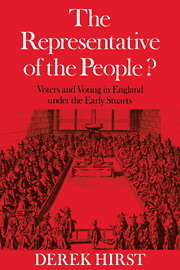9 - Accountability and national politics
Published online by Cambridge University Press: 15 December 2009
Summary
Reports
The prerequisite for a representative system that continues to work after the election is that information should be available in the constituencies. Only then can constituents act effectively. Members felt the need to justify themselves at home when they had been involved in granting away their neighbours' money, but fiscal matters were not the only subject which occasioned reports home. Knowledge of parliament's activities was surprisingly common in the localities.
Again, it must be stressed that this was not wholly novel. We have seen Sir Thomas More telling his audience to inform their localities of the King's marital problems, and the Secretary, Sir Robert Cecil, complained in the monopolies debate of 1601 that ‘Parliament matters are ordinarily talked of in the streets. I have heard myself, being in my coach, these words spoken aloud: “God prosper those that further the overthrow of these monopolies. God send the prerogative touch not our liberty.”’ He made much the same point a couple of weeks later when he alleged that the chief critics of the government ‘have desired to be popular without the House for speaking against Monopolies’. James I's attacks on those who ‘hasten after grievances’ in the House as seekers of ‘popularity’ are equally founded on the assumption that parliament men were speaking outside the House as well as in it.
Cursory analysis of the available evidence risks distortion, for it is undoubtedly merely as a result of chance that we can know much more about such communication between the House and the outside world in the 17th century than is possible for earlier periods.
- Type
- Chapter
- Information
- The Representative of the People?Voters and Voting in England under the Early Stuarts, pp. 178 - 188Publisher: Cambridge University PressPrint publication year: 1975
- 1
- Cited by



